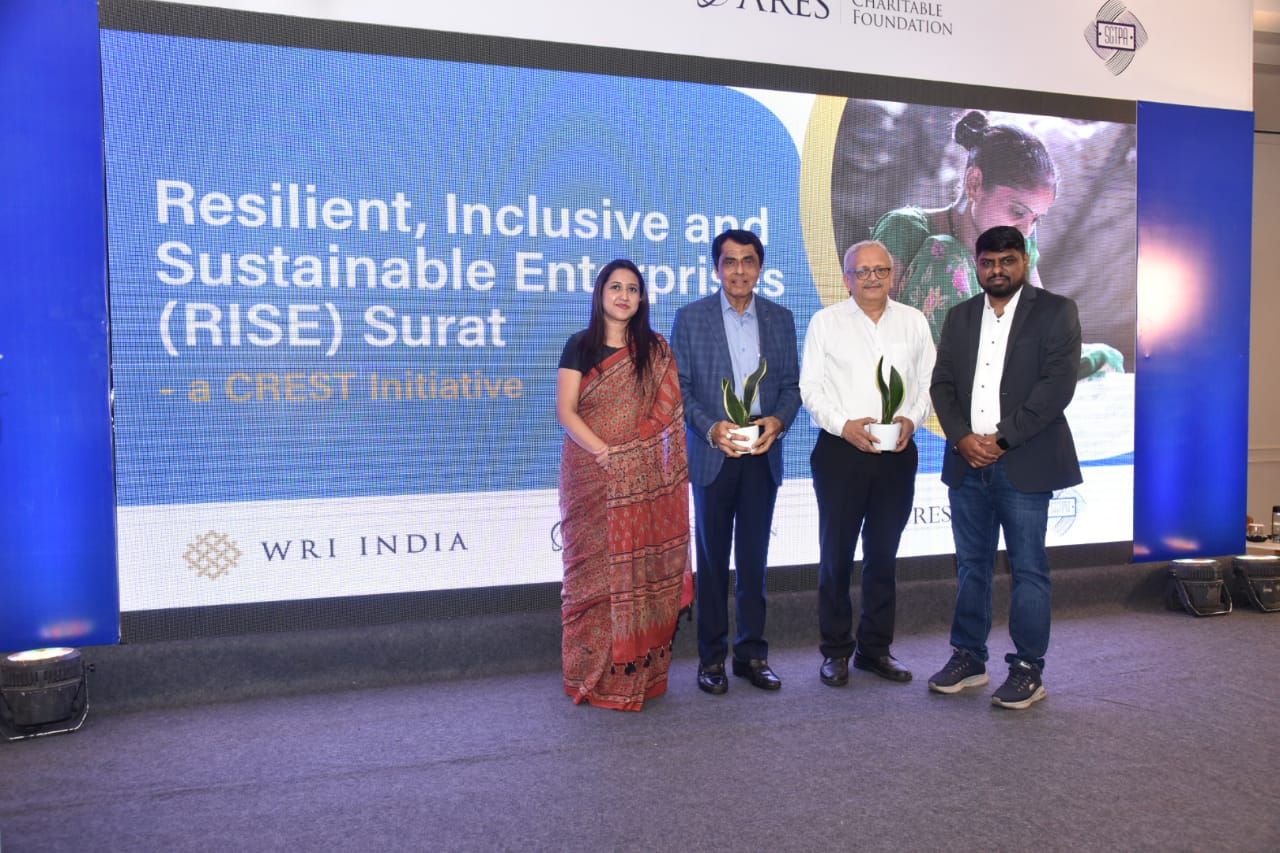
RISE-Surat
Building future-ready textile MSMEs and workforce in Surat
Under RISE-Surat, WRI India will work towards supporting the cluster’s textile MSMEs through research, industry engagement, capacity building, and skilling. This will help build future-ready, resilient, and sustainable MSMEs that engage a green, inclusive workforce.
By undertaking vulnerability assessment and training workshops, the initiative aims to handhold textile MSMEs and assist them in implementing feasible solutions for greener operations and a just and inclusive low-carbon transition.
 |
RISE-Surat Launch
To equip MSMEs and workers in Surat’s textile sector, WRI India unveiled RISE-Surat. By 2026, the initiative will provide MSMEs with a clear understanding of the potential climate impacts and changes needed for a low-carbon transition. It will work to underscore the advantages of adopting sustainable strategies and illustrate how these can enhance competitiveness and resilience. By conducting capacity-building programs, skilling programs, and raising awareness on accessing finance, RISE-Surat will support the implementation of sustainable practices by textile MSMEs in the cluster. Learn more.

Workshops and Trainings
Boiler Training Series
WRI India has been working with various line departments of Surat and textile MSME associations to organize a training series for boiler operators to enhance their learning of efficient boiler operations for textile MSMEs in Surat.
Through practical sessions, the trainings work on building the capacities of boiler operators on the safety protocols and improving the operational efficiency of boilers by minimizing heat loss and steam generation costs.
Energy-Efficient Technology and Finance
WRI India, in collaboration with GEDA (Gujarat Energy Development Agency), Gujarat Pollution Control Board Regional Office (Surat), and South Gujarat Textile Processors Association (SGTPA) hosted a successful workshop on 'Energy-Efficient Technology and Finance' in Surat on June 27, 2024. The event brought together over 110 stakeholders including textile processing MSMEs, association representatives, energy-efficient technology providers, financing agencies, industry experts, and policymakers to discuss and promote the adoption of energy-efficient technologies and improve access to finance for MSMEs.
LinkedIn Summary: Post | LinkedIn
Meeting with Advisory Group Members
WRI India, along with the Gujarat Pollution Control Board - Surat, hosted its advisory group members consisting of key stakeholders from Surat's textile processing cluster instrumental in shaping activities aimed at assisting MSMEs and their workers in transitioning towards a low-carbon and climate-resilient future. Members at the meeting included MSME owners, training institutes, academia, policymakers, and industry associations.
The meeting saw WRI India provide key updates on the progress of engagements with MSME owners and workers, focusing on increasing the adoption of energy-efficient technologies, shifting to biofuels, mapping climate vulnerability, and designing training programs for workers.
LinkedIn Summary: Post | LinkedIn
Investment Bazaar - Energy Efficiency Financing
With 65+ attendees representing MSMEs, financial institutions, technology providers, policymakers, and industry experts, discussions at the workshop focused on the gaps in access to technology and finance advancements as well as opportunities in energy-efficient technologies for industrial application.
Organized in association with the Gujarat Energy Development Agency (GEDA) and the Bureau of Energy Efficiency (BEE), the workshop also highlighted the need for bridging the technology gap for local needs, robust data monitoring, and stakeholder collaboration.
LinkedIn Summary: Post | LinkedIn
Stakeholder Consultations
WRI India has been engaging with several textile processing MSMEs and workers from Surat's Palsana, Pandesara, Sachin, and Kadodara sub-clusters, to map their needs as they transition to a low-carbon textile sector amidst worsening climate impacts.
Consultations with the stakeholders brought out the need for MSMEs to transition to alternative fuels, adopt resource efficient technologies, as well as strategize to become more resilient. Capacity building and skilling workshops with MSME owners, mid-level, and shop-floor workers will help achieving the desired outcomes.
To help implement interventions in key areas, RISE-Surat has been engaging with key stakeholders at the local, state and national-level such as the Surat Municipal Corporation, Gujarat Pollution Control Board, Gujarat Energy Development Agency, Energy Efficiency Services Limited, NTPC Limited, Textiles Skill Sector Council, Skill Council for Green Jobs, and more.


